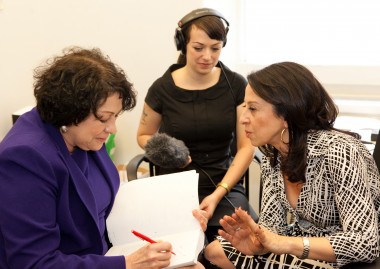Author: Mike Janssen
Mike has held the role of digital editor since 2014. Before becoming editor, he covered public radio and digital initiatives in public media for Current. Mike has also written for a variety of publications as a freelancer, was a Public Media Corps fellow, and has hosted talk and music shows on community radio stations in the Washington, D.C., area. In his spare time, he enjoys spending time with his family, playing banjo, cooking, and making coffee and cocktails.
With board appointment, Pacifica’s executive director drops “interim” from title
The board of the Pacifica Foundation on Monday appointed Summer Reese executive director of the five-station radio network, a position she has ...By Mike JanssenNovember 11, 2013Houston Public Media eliminates eight full-time positions
Houston Public Media announced Nov. 7 the layoffs of eight staffers as part of a reorganization to create more multiplatform arts coverage. Four ...By Mike JanssenNovember 7, 2013With board support gone, KBOO leader calls it quits
The Portland community station has new leadership at the top and on its board after a failed bid to revamp workplace practices.By Mike JanssenNovember 6, 2013WBAI interim p.d. quits over fundraising programming
Andrew Phillips resigned last month as interim p.d. of Pacifica’s WBAI in New York, a post he accepted less than three months ...By Mike JanssenOctober 31, 2013Ken Rudin offers public radio a new weekly dose of “Political Junkie”
The demise of NPR’s Talk of the Nation ended Ken Rudin’s regular appearances on many public radio stations, but the “Political Junkie” is aiming ...By Mike JanssenOctober 23, 2013NPR unveils new voice of underwriting credits
NPR hired voice-over and theater actress Sabrina Farhi as the new voice of its underwriting credits, with her on-air debut to come ...By Mike JanssenOctober 23, 2013NPR to announce new voice of underwriting credits
NPR plans to unveil tomorrow the name of the on-air talent who has been chosen to voice its underwriting credits as a ...By Mike JanssenOctober 22, 2013WFUV seeks membership boost with new mix of music
New York’s WFUV has expanded its music mix and dropped NPR newscasts, with a goal of enticing more listeners to become members. Starting ...By Mike JanssenOctober 21, 2013FCC extends deadline for LPFM applications
The FCC has set a new deadline for applicants seeking licenses for low-power FM stations, agreeing to keep its filing window open ...By Mike JanssenOctober 21, 2013Pacifica seeks nonprofit to take over most operations of New York’s WBAI
The Pacifica Foundation is seeking another nonprofit organization to help operate WBAI, its financially struggling station in New York. In a Request for ...By Mike JanssenOctober 16, 2013After Talk of the Nation, Neal Conan’s first gig takes him to Greenland
Neal Conan’s first foray out of the studio in 11 years took him very far from the studio indeed — all the ...By Mike JanssenOctober 14, 2013Gambit to go independent opens new doors for Hinojosa
In launching her own media company, Maria Hinojosa sought to bring a “consistent presence” of a Latina journalist to PBS and take ...By Mike JanssenOctober 10, 2013DOJ still harshing the mellow for pot dispensary sponsorships
An Aug. 29 update of Department of Justice policies for enforcing marijuana laws did little to clarify whether public radio stations should ...By Mike JanssenOctober 10, 2013WLRN backpedals after host dumps talk show guest
The author of a book arguing for the innocence of five convicted Cuban spies found himself disinvited from an appearance on Miami’s ...By Mike JanssenOctober 8, 2013Knell’s departure stalls discussions about expanding NPR’s Code Switch
Talks between NPR and CPB about expanding the network’s Code Switch to a local and regional level are on hold as NPR ...By Mike JanssenOctober 7, 2013




